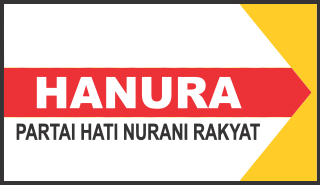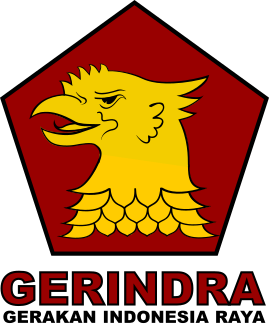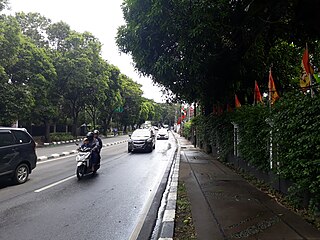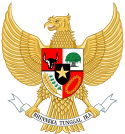
The Indonesian Democratic Party of Struggle is an Indonesian political party, and the party of the current President of Indonesia, Joko Widodo.

Indonesia held legislative elections on 5 April 2004 for both houses of the People's Consultative Assembly, the country's national legislature. This included all 550 seats in the People's Representative Council and 128 seats of the new Regional Representative Council.

Elections in Indonesia have taken place since 1955 to elect a legislature. At a national level, Indonesian people did not elect a head of state – the president – until 2004. Since then, the president is elected for a five-year term, as are the 560-member People's Representative Council and the 128-seat Regional Representative Council.

The National Mandate Party, frequently abbreviated to PAN, is an Islam-based political party in Indonesia.

The Crescent Star Party is a political party in Indonesia.
The Indonesian Justice and Unity Party is a political party in Indonesia.

Legislative elections were held in Indonesia on 29 May 1997. There were actually three elections in one as voters were electing members of two levels of regional government as well as the House of Representatives. This was to be the last election of President Suharto's New Order regime, which collapsed a year later. Like the preceding New Order elections, it was won outright by the Golkar organization.

Indonesia's second legislative election, and the first under the New Order regime, was held on 3 July 1971. There were 10 participants; 9 political parties and the "functional group" Golkar.

Indonesia's third legislative election, and the second under the New Order regime, was held on 2 May 1977. There were three participants; the two political parties and functional groups Golkar.

Indonesia's fourth legislative election, and the third under the New Order regime, was held on 4 May 1982. There were three participants; the two political parties and the "functional group" Golkar.

Indonesia's fifth legislative election, and the fourth under the New Order government, was held on 23 April 1987. There were three participants; the two political parties and the "functional group" Golkar. Like all the New Order elections, it was an outright victory for Golkar.

The 1999 Indonesian legislative election, held on 7 June 1999, was the first election since the end of the New Order and the first free election in Indonesia since 1955. With the ending of restrictions on political activity following the fall of Suharto, a total of 48 parties contested the 462 seats up for election in the People's Representative Council. A further 38 seats were reserved for the armed forces.

The People's Conscience Party is a political party in Indonesia. It was established following a meeting in Jakarta on 13–14 December 2006 and first headed by former Indonesian National Armed Forces commander Wiranto.

The Great Indonesia Movement Party is a political party in Indonesia. In the 2014 presidential election, the party was represented by former Indonesian Army Strategic Reserve Command and Indonesian special forces commander Lieutenant General Prabowo Subianto. Prabowo lost to Joko Widodo in the election, earning 46.85% of the vote to Widodo's 53.15%.

The Berkarya Party is an Indonesian political party formed in 2016. The party is led by the youngest son of former president and dictator Suharto, Hutomo Mandala Putra. Better known as Tommy Suharto, he is a convicted murderer by proxy. Berkarya is one of 16 political parties eligible to contest Indonesia's 2019 general election. The party is supporting Tommy's former brother-in-law Prabowo Subianto for the presidency in 2019.

The 27 July Incident was an attack by Indonesian government forces on the head office of the Indonesian Democratic Party, which was being occupied by supporters of recently ousted party leader Megawati Sukarnoputri. It was followed by two days of riots in Jakarta.

The Indonesian electoral law of 2017, also known in Indonesia as Undang-Undang Pemilu, is the law regulating elections in Indonesia. Officially, it is known as the Law Number 7 of 2017. The law was passed in July 2017 following nine months of debate in the People's Representative Council.

















